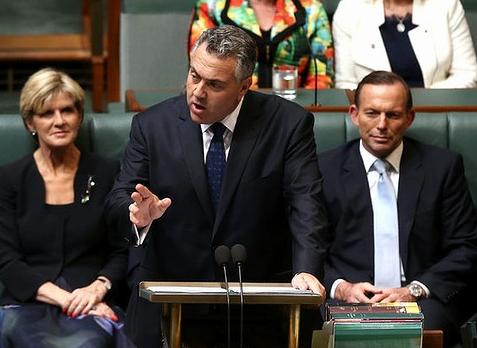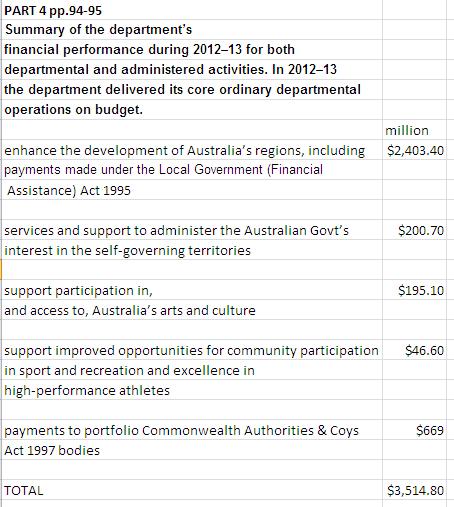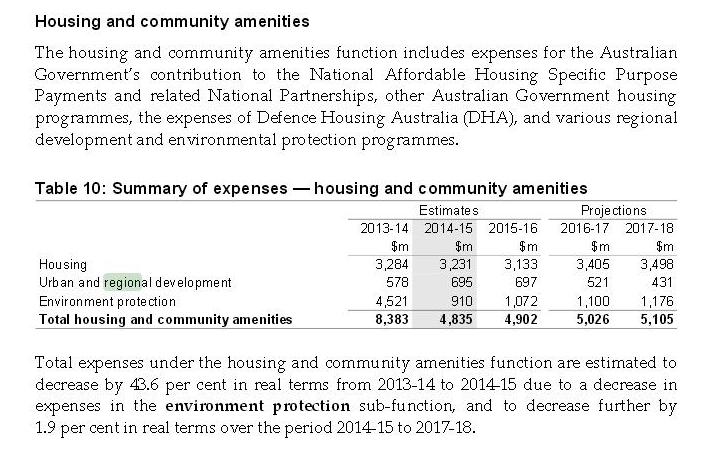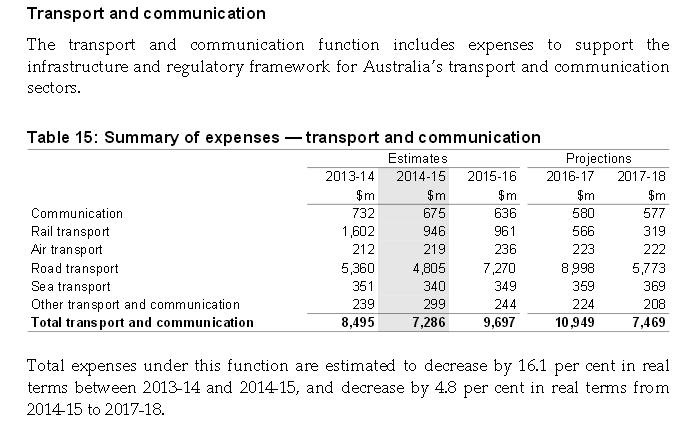Submitted by Steve Irons on Sat, 17/05/2014 - 9:33pm
The Abbott government's 2014 Budget - Cut, Cut, Cut!
Overview
Last Tuesday 13 May 2014, Treasurer Hockey presented in the House of Representatives the first Budget paper of the Abbott government. The budget is being used for political purpose; as a tool for class promotion; a tool to force a mean conservatism on an unsuspecting electorate. It is a savage and vitriolic budget aimed at setting up a new world order, which can be broadly referred to as "neoconservative policies" adopted by a bunch of red neck conservatives who have adopted them because they have been adopted in other countries by people they admire, but seriously lacking the "neoconservatism" ideology you find in other countries to back up such neoconservative-type policies. (See my recent article on Swingeing traditions http://www.bloggerme.com.au/swingeing-new-term-oz-body-politic).
These include free market supply-side economics, classical liberalism and fiscal conservatism. The Liberals promoting these policies are incapable of promoting the ideology that has always been key to the success of such ideologies in other countries.

The result is a mess.
It is a serious attack on wide ranging aspects of life in Australia, broadly accepted as fundamental to what it means to be an Australian. But it lacks any reason for being, apart from a reference to a "debt crisis" which is necessary because there has been no attempt to promote any fundamental ideological stand, and to seek wide-ranging public support based on ideology.
(For some insight into the background ideology listen to the views of the auditor appointed by Hockey to give him some reason to introduce draconian changes http://www.news.com.au/finance/economy/commission-of-audit-report-paints...).
Ideology without ideology - "we can't afford it"
So almost every change introduced by the Treasurer is ideological in style but lacks any understanding of why it is being promoted, except a "whinge"; some undeveloped idea that "we can't afford it". Since Australia has the most robust economy in the west, support based on this "whinge" is superficial and does not stand up to any serious examination. It will be interesting to see how much of this weak ideology can survive attacks in a hostile senate.
Almost every topic in the budget is subjected to this ideological reallignment, with almost everyone referred to in the Budget being "losers" (with a few notable exceptions; the main "winners" being road builders, mining corporations, media barons, the banks, military equipment suppliers). Those losers who rely on the general social goodwill usually found in the budget for their basic quality of life are being forced to take a savage cut. If this budget successfully passes both houses of parliament, Australia is set to become a less egalitarian, less socially aware, less accepting of multiculturalism/diversity/Indigenous culture, more nasty, more self-centred and money grubbing, poorer, with the big benefits of life in Australia being set to be turned back into the past, and all for growth and profit. Nuh, not my cuppa tea.
Changes in the Budget
I prepared a brief summary of key policy changes in the Budget for Small Business Australia, see http://lnkd.in/bBkacV3.
The main changes in that summary that will affect quality of life for all Australians include:
Company tax rate falls but all other taxes increased, including FBT, new Debt Levy, Super, HELP, Medicare levy increases but also pay the GP, increase in qualifying age of pension to 70, First Home buyer scheme abolished, offsets scrapped, eligibility for support made harder & support levels reduced.
But if you want to get some feel for the enormity of the Hockey cuts go to the Budget Expense side http://www.budget.gov.au/2014-15/content/bp2/html/bp2_expense.htm and browse down the 21 pages of expense measures. If you do that you will see almost every one of these contains cessation, termination, abolition, withdrawal, reduction, limitation, removal, reversal, rationalisation, reforms, savings, finalisation, a huge number have Smaller Government in their title, meaning they are being wiped off the Budget.
Specific concerns for BloggerMe - Regionalism & Indigenous Affairs
Two areas of the Budget are deeply concerning for BloggerMe:
1. Infrastructure and Regional Development - big changes to what "regional development" means in Australia. I will deal with this one tonight.
2. Indigenous Affairs - huge cuts in support for Aboriginal support by government under the guise of "rationalisation" - the elimination by the Prime Minister's department of so-called "waste and duplication" while at the same time increasing support of the police assigned social control functions in Indigenous communities. I will deal with this under separate cover.
A look at one aspect of the Budget - Regionalism
Regionalism under Rudd/Gillard
Regionalism played an important part in the Budget during the Rudd-Gillard years. I didn't agree with their definition of what a 'region' was; it was too ad hoc and too based on "who is prepared to see themselves as a region?"; too community-project based; to be of much use in promoting real focus on life outside the State centres of power and influence, which is what Australia urgently needs, and why BloggerMe was set up. But at least they were doing stuff that shifted the focus into the so called 'regions'. If you want to get a feeling for the expanse of regional projects you can take a look at the operations described in the department's Annual Report 2012-13 http://www.infrastructure.gov.au/department/annual_report/2012_2013/regi... This annual report shows some $3.5 billion spent by the department in 2012-13 in promoting regional development.
http://www.infrastructure.gov.au/department/annual_report/2012_2013/regi...
My attempt to understand the Abbott govt's attitude to regional development - what's going on?
I had problems in my first analysis of the Budget papers as I interpreted new spending initiatives on infrastructure contained in the Budget as being the same funds as funds previously committed for community and regional projects. This was an amount of $2922 million and it was enough to throw out my analysis. It looked like there was a big move of previously committed funds. I now understand my mistake. It was a classic mistake of someone untrained in governmental planning, combined with an accidental equality between two completely different figures.
Budget1 http://www.budget.gov.au/2014-15/content/bp2/html/bp2_prelims.htm p6-31
Let me explain: I really wanted to understand what the plans for urban and regional devlopment were, so I took a detailed look at the Expense Measures section and compared it to the one-liner in the summary at the front. And a got something I wasn't expecting.
Expense Measures : http://www.budget.gov.au/2014-15/content/bp2/html/bp2_expense-18.htm
Budget7 http://www.budget.gov.au/2014-15/content/bp2/html/bp2_prelims.htm p6-53
Budget2 http://www.budget.gov.au/2014-15/content/bp2/html/bp2_prelims.htm p6-31
I got my $2.922 billion in expenditure from 2013-2018, down to the exact million dollars, but the "urban & regional development projects" were nowhere to be seen. Something was radically wrong. These were all new projects coming out of new government initiatives. Did this mean the end of regionalism in Australia? But if so, where were the expenditures on projects in the year 2013-14? Either $578 million shown in Estimates was a lie and there was no intention to spend the rest of the $2922 million on projects (apart from the National Stronger Regions Fund which is there) OR there is another $2922 million in Community Grants somewhere else, but not described in the Expense Measure chapter, but then the $200 million per annum over three years would be a lie. The absurdity of this took me out of my comfort zone, and I decided to leave it hanging in the air.
As it turned out the Budget papers only showed details of commitments not already agreed upon in the MYEFO - Mid-year Economic and Fiscal Outlook 2013‑14, a fact that I had stupidly overlooked. I contacted the Department and got good support. They didn't solve the riddle but their questions provided me with the tools to solve the riddle myself.
Regionalism under Abbott - a change in focus
The Budget showed a commitment of $2922 million on urban and regional development over 5 years. Expenditure actually increased in 2014-15 stayed stable in 2015-16, then reduced by a $176 million in 2016-17 and by another $90 million in 2017-18. A classic wind down. But it wasn't the enormous and immediate shut down that I had imagined. You might say I was being paranoid because of the "lies" causing lots of distress on social media. I prefer to claim that I am just naive; I saw the MYEFO warning at the top of the detailed budget statements but ignored it.
Anyway, there was another $2922 million detailed in the Budget for infrastructural initiatives:
Budgetcalc - detail taken from http://www.budget.gov.au/2014-15/content/bp2/html/bp2_expense-18.htm
The context of cuts to Regionalism - Housing transport & communication cuts
This was happening in the context of cuts that were happening to all departments across the Abbott government (with a few exceptions such as Defense).
Budget1 http://www.budget.gov.au/2014-15/content/bp2/html/bp2_prelims.htm p6-31
Housing is actually stable so falling slightly for a couple of years in real terms and then increasing a bit. The huge cut is in 'environment protection' with $3.5 billion some 80% being wiped off the Budget.
Budget3 http://www.budget.gov.au/2014-15/content/bp2/html/bp2_prelims.htm p6-40
Transportation infrastructure remains pretty stable apart from two giant changes: More than half a billion (40%) in 2014-15 is wiped off rail transport and its intention for 80% to be wiped off by 2017-18. Road transport gets a couple of billion injected into it in 2015-16 and a couple of billion in 2016-17.
Budget5 http://www.budget.gov.au/2014-15/content/bp2/html/bp2_prelims.htm p6-40
Communications is cut and then cut dramatically as digital projects are completed. It doesn't mention NBN so it's hard to understand what they are talking about and what the "sale of radio spectrum frequency" is, is anyone's guess.
Budget4 http://www.budget.gov.au/2014-15/content/bp2/html/bp2_prelims.htm p6-40
Conclusion
Although not an immediate shut down in regionalism, there is definitely a new focus away from community and regional projects and onto infrastructural national projects and this change is starting immediately. We can get some idea of the huge change in focus from comparing the 2013-14 Budget Papers with the 2014-15 Budget Papers. Click here >
On 2013-14 http://www.bloggerme.com.au/comment/31255#comment-31255 we see almost everything focussed on local community and regional projects.
On 2014-15 http://www.bloggerme.com.au/comment/31256#comment-31256 we see huge focus move towards infrastructural national projects and away from local community and regional projects. It would be interesting to know the regional projects planned for elimination in future Budgets 2016-17 $176 million 2017-18 $90 million.
Steve Irons May 2014
References
http://www.regional.gov.au/regional/
http://investment.infrastructure.gov.au/funding/
http://www.infrastructure.gov.au/department/statements/2014_2015/budget/...





.JPG)




Comments
Steve Irons
Fri, 23/05/2014 - 12:27pm
Permalink
Budget - impact on homelessness
READ more: http://bit.ly/1gV6nk7
Steve Irons
Thu, 22/05/2014 - 2:59pm
Permalink
This year Budget 2014-15
Source: http://www.infrastructure.gov.au/department/statements/2014_2015/budget/...
1.1: Strategic direction statement @ http://www.infrastructure.gov.au/department/statements/2014_2015/budget/...
The Department supports the Australian Government to respond to emerging and critical issues affecting the nation, including: growing demand for infrastructure and transport; improving the social and economic outcomes for Australia's regions; dealing with the opportunities and challenges presented by projected population and demographic changes; and increasing Australia's economic prosperity.
In accordance with the four outcomes outlined in the Portfolio Overview, the Department is responsible for providing policy advice and targeted research, delivering administered items and regulation for the following programmes:
These programmes are described in detail in Section 2 of this document, ‘Outcomes and Planned Performance’.
From 1 July, the Department will consist of eight divisions that in aggregate deliver these programmes, including a Corporate Services division. Employees are made available by the Department to assist the Infrastructure Coordinator who supports Infrastructure Australia1 in the performance of its functions. The Department also provides employees in support of the International Air Services Commission and the Office of the Inspector of Transport Security.
On behalf of the Deputy Prime Minister and Assistant Minister, the Department oversees the Australian Maritime Safety Authority (AMSA), the Australian Transport Safety Bureau (ATSB), Airservices Australia, the Civil Aviation Safety Authority (CASA), the National Capital Authority (NCA), and the operations of the National Transport Commission (NTC) in collaboration with the states and territories through the Council of Australian Governments (COAG) Transport and Infrastructure Council.
The Department is at the forefront of the Australian Government's efforts to secure Australia's economic future and improve living standards, particularly through infrastructure planning and strategic investment in transport infrastructure, transport system reform, regulation of safety and security and strategic development of policies and programmes. The Department also assists regions and local communities to strengthen and diversify their economic base and provides non-self-governing territories with community services and capital investment.
A high priority for the Department in 2014-15 is progressing the Australian Government's commitment to reduce the cost of the regulatory burden on industry, community groups, and individuals. The Department's regulatory savings will make a significant contribution to the achievement of the Australian Government's commitment to reduce regulatory burden by a net $1 billion a year. The portfolio's efforts to reduce red tape to ensure that the Australian Government is not imposing unnecessary restrictions on business and the community will be balanced by the need to maintain the safety and security of our transport systems.
The portfolio has an economic investment focus—a focus which is critical to the economic development of all regions to meet the growth and development challenges the nation faces. The Infrastructure Investment Programme and supporting future infrastructure investment decisions will continue to be a priority, and the transport agenda continues to involve significant national and international reforms.
The addition of outcomes 3 and 4 to the portfolio's responsibilities from September 2013 provide the opportunity to integrate regional economic development with Australian Government infrastructure investment programmes. This focus will assist in delivering economic and social outcomes for regions across Australia. The Department's responsibilities for promoting effective local government and for external territories administration will further contribute to a strong and liveable Australia.
In addressing the growth and development challenges that lie ahead for Australia, the Department will build on policy development and delivery capability, and further strengthen engagement and partnership with stakeholders and the users of services.
Other key priorities for 2014-15 include:
The Department is focused on delivering against outcomes in these areas, meeting the Australian Government's expectations and on building capability within the Department. The Department seeks to do this through: having a view on the right outcome; driving policy reform; leading programme and project delivery; effective regulation; leading investment strategy; and fostering a high performing workforce.
http://www.infrastructure.gov.au/department/statements/2014_2015/budget/...
Steve Irons
Thu, 22/05/2014 - 2:49pm
Permalink
Last year Budget 2013-14
Source: http://www.regional.gov.au/department/statements/2013-14/portfolio-budge...
1.1 STRATEGIC DIRECTION STATEMENT
The key role of the Department of Regional Australia, Local Government, Arts and Sport (DRALGAS) is to strengthen communities and regions by improving local opportunities, creativity, productivity and wellbeing and by supporting participation and excellence in cultural and sporting activities. The Department makes a difference by:
The Department’s four outcomes are:
Steve Irons
Mon, 19/05/2014 - 1:46pm
Permalink
Notes
Some details on the additional budget items -
Budget6 http://www.budget.gov.au/2014-15/content/bp2/html/bp2_prelims.htm p6-41
Budget9 http://www.budget.gov.au/2014-15/content/bp2/html/bp2_prelims.htm p1-11
Add new comment